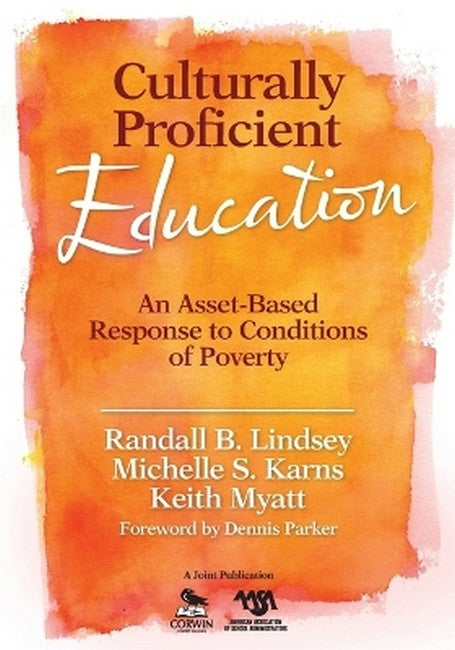Randall B. Lindsey is Emeritus Professor at California State University, Los Angeles. He has served as a teacher, an administrator, executive director of a non-profit corporation, as Interim Dean at California Lutheran University, as Distinguished Educator in Residence at Pepperdine University, and as Chair of the Education Department at the University of Redlands. All of Randy's experiences have been in working with diverse populations and his area of study is the behavior of white people in multicultural settings. His Ph.D. is in Educational Leadership from Georgia State University, his Master of Arts in Teaching is in History Education from the University of Illinois, and his B.S. in Social Science Education is from Western Illinois University. He has served as a junior high school and high school teacher and as an administrator in charge of school desegregation efforts. At Cal State, L.A. he served as Chair of the Division of Administration and Counseling and as Director of the Regional Assistance Centers for Educational Equity, a regional race desegregation assistance center. With co-authors he has written several books and articles on applying the Cultural Proficiency Framework in various contexts. Email - randallblindsey@gmail.com Website - CCPEP.org Twitter - @RBLindsey41 Michelle S. Karns, MPA, is an educational consultant with over 30 years' experience in school support and reform, including speaking before the United Nations at the World Conference on Children in 1995. Working with students, administrators, and teachers in districts through the United States and Canada, Michelle helps create the conditions for all students to learn and makes academic success complemented by social and emotional health a reality. She is especially successful working in under-resourced, minority districts that are experiencing internal and external challenges. Michelle combines current academic research and resiliency research in support of hundreds of Title I schools achieving equity and excellence. She is an author of several books and multiple educational reform articles and works to help students and teachers build positive relationships and meet their academic and personal success goals. She is an avid advocate of parents as partners in school reform and is diligent in making that process possible for her districts. Keith Myatt, Ed.D., was a full-time instructor in the School Leadership Programs at California State University, Dominguez Hills where developing school leaders dedicated to dismantling systems of oppression and focusing on Cultural Proficiency were at the heart of the program. Prior to that he was at the Los Angeles County office of Education in Educational Leadership Services as a director in the California School leadership Academy (CSLA). He is coauthor of Culturally Proficient Education: An Asset-Based Response to the Conditions of Poverty (Corwin, 2010) and Culturally Proficient Coaching, Supporting Educators to Create Equitable Schools, (Corwin, 2020). He has worked at the Museum of Tolerance providing seminars for educators wishing to establish Cultural Proficiency as an element of their work and provided seminars for educators supporting credential candidates with the tools of Cultural Proficiency and Coaching. He has recently been working to implement the California Administrator Performance Assessment and is currently helping to develop an Ed.D. program at Dominguez Hills dedicated to creating school systems focused on the success of each and every child.
Request Academic Copy
Please copy the ISBN for submitting review copy form
Description
Foreword by Dennis Parker Acknowledgments About the Authors Part I. Why Poverty and Cultural Proficiency? Introduction 1. Asset-Based Approaches to Students From Low Income or Impoverished Communities 2. The Middle Class School in Communities of Poverty 3. The Cultural Proficiency Tools Build on Assets Part II. Pro-social School Applications 4. Culturally Proficient Pedagogy 5. Culturally Proficient Leadership Support for Instruction 6. Policy Development to Ensure and Support Teaching and Learning Part III. A Call to Action 7. A Call to Action: The Time Is Now Appendix A: Cultural Proficiency Conceptual Framework Appendix B: State Teachers' Association Retreat Script Appendix C: Taniko's Poem Appendix D: How to Use Cultural Proficiency Books References Index
"Students in poverty circumstances need us more than ever. This book provides tools, resources, and thought-provoking vignettes to illustrate what can transform our educational practice to meet the needs of all kids. After reading this book, I am astounded by how we have compartmentalized educational programming to reduce achievement gaps and yet, after decades of research, found this to be ineffective. This new application for cultural proficiency is a testament to the educator-student relationship based on respect, understanding, and a common purpose, no matter what the background or culture of the student happens to be. We can't afford for more students to disengage from education. Thankfully, the authors frame that for us in a way that builds on where we are in our learning and moves us forward toward a positive, asset-building environment rather than a destructive deficit mind-set." -- Kathleen Gavin, Coordinator of Professional Development "Before we can look at our students in a way that emphasizes what strengths and skills they bring to the classroom, we need to look at ourselves, our biases, and preconceptions. This book is an interactive model that uses the tools of cultural proficiency as a lens to look not only at our students, but also ourselves. This self-reflection enables us to be more effective for all our students." -- Rick Mooradian, Teacher

